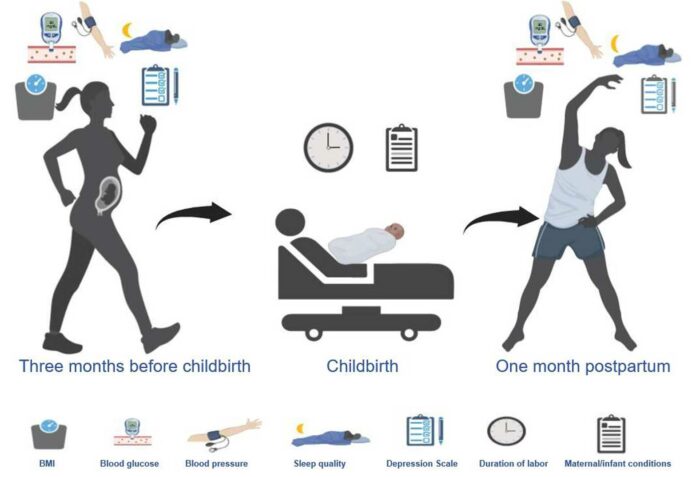Exercises that make you breathe harder, like running or cycling, are known to make your mind feel better and lessen bad feelings like anxiety. But when it comes to helping moms with postpartum depression (PPD), where some moms feel sad after having a baby, research has mixed results. Some say exercise helps, while others say it doesn’t much. It seems the type of exercise, how hard it is, and the person’s differences might be why.
A new study recently published in PLoS ONE addresses this gap. The study comprehensively gathered evidence on the preventive and therapeutic effects of aerobic exercise on PPD.
The study suggests that exercise may reduce postpartum depression, with moderate-intensity exercises three to four times a week being especially effective.
According to a previous study, engaging in at least 150 minutes of moderate-intensity aerobic exercise every week can significantly heighten the effectiveness of physical activity in preventing and treating PPD. However, there needs to be more comprehensive data on the most effective aerobic exercise intervention program for preventing and treating PPD.
According to this new study, aerobic exercise may be beneficial for both preventing and treating PPD, but how effective it is will depend on several factors, such as the goal of the exercise intervention, the volume of the exercise, supervision, the type of exercise (individual or group), and individual differences.
Scientists performed three subgroup analyses using the previously given hypothesis. According to subgroup analysis, there may have been heterogeneity in this trial because of the intervention goal (prevention vs. treatment), which shows that the preventive benefits of aerobic exercise outweigh the therapeutic benefits. It is commonly recognized that doing the right kind of aerobic exercise when pregnant helps avoid pregnancy issues in addition to promoting pelvic mobility and increasing birth canal space to alleviate labor pain.
The “Test for subgroup difference” results indicate no significant differences were observed in the outcomes of the supervised vs. unsupervised subgroup. By comparing the consequences of the ‘Subtotal,’ the combined effect size of team exercise is more significant than individual exercise, and the combined effect size of the supervised exercise group is more important than that of the unsupervised group. However, these differences are statistically insignificant.
Studies have shown that social support plays a critical role in maintaining the mental health of expectant and new mothers. Supervised and team-based exercises are two ways to provide social support to expectant and new mothers effectively.
Next, using a network meta-analysis, scientists looked into whether the types and amounts of exercise significantly impacted the prevention and treatment of postpartum depression. The network meta-analysis’s findings highlight that, except for the yoga group, every other group shows better intervention effects than the control group.
No statistically significant differences were found in pairwise comparisons between the dance, swimming, cycling/walking/running (jogging), and other exercise groups. This suggests that the type of aerobic exercise had no direct impact on the benefits of the intervention.
Scientists noted, “Different individuals have varying preferences for types of exercise, so we speculate that experimental participants might exhibit different levels of adherence to the same exercise type. This implies that these exercise types might not directly cause differences in intervention effects; patients’ adherence to the prescribed exercise is the direct factor influencing intervention outcomes.”
The results from network meta-analysis suggest that engaging in aerobic exercise 3 to 4 times per week, with a moderate exercise intensity and a duration of 35 to 45 minutes, represents a more optimal, precise, and effective planned exercise volume range.
Journal Reference:
- Xu H, Liu R, Wang X, Yang J (2023) Effectiveness of aerobic exercise in the prevention and treatment of postpartum depression: Meta-analysis and network meta-analysis. PLoS ONE 18(11): e0287650. DOI: 10.1371/journal.pone.0287650
